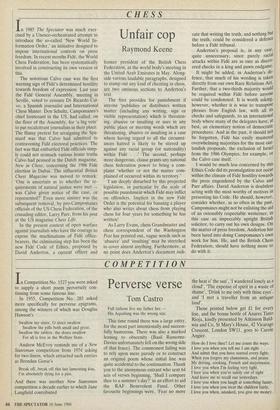CHESS
In 1985 The Spectator was much exer- cised by a Unesco-orchestrated attempt to introduce the so-called 'New World In- formation Order,' an initiative designed to impose international controls on press freedom. In recent months Fide, the World Chess Federation, has been systematically involved in constructing its own version of this.
The notorious Calvo case was the first warning sign of Fide's determined hostility towards freedom of expression. Last year the Fide General Assembly, meeting in Seville, voted to censure Dr Ricardo Cal- vo, a Spanish journalist and International Chess Master. Don Schultz, Campomanes's chief lieutenant in the US, had called, on the floor of the Assembly, for 'a big vote' to put recalcitrant journalists in their place. The flimsy pretext for arraigning the Spa- niard was that Calvo had admitted to contravening Fide electoral practices. The fact was that embattled Fide officials simp- ly could not stomach various home truths Calvo had penned in the Dutch magazine, New in Chess, concerning the 1986 Fide election in Dubai. The influential British Chess Magazine was moved to remark: `One is uncertain as to whether the re- quirements of natural justice were met was CaIvo given notice of the case, or represented?' Even more sinister was the subsequent removal, by pro-Campomanes officials of the US Chess Federation, of the crusading editor, Larry Parr, from his post at the US magazine Chess Life.
In the present context of open warfare against journalists who have the courage to expose the machinations of Fide office- bearers, the culminating step has been the new Fide Code of Ethics, proposed by David Anderton, a current officer and
Unfair cop
Raymond Keene
former president of the British Chess Federation, at the world body's meeting in the United Arab Emirates in May. Along- side various laudable paragraphs, designed to stamp out any kind of cheating in chess, are two ominous sections to Anderton's text.
The first provides for punishment if anyone 'publishes or distributes written matter (including any writing, sign or visible representation) which is threaten- ing, abusive or insulting or uses in any public place or meeting words which are threatening, abusive or insulting in a case where having regard to all the circumst- ances hatred is likely to be stirred up against any racial group (or nationality) within Fide . .' The second, perhaps more dangerous, clause grants any national chess federation power to bring a com- plaint `whether or not the matter com- plained of occurred within its territory.'
I am deeply disturbed by this projected legislation, in particular by the scale of possible punishment which Fide may inflict on offenders. Implicit in the new Fide Order is the potential for banning a player who also writes about chess from playing chess for four years for something he has written!
As Larry Evans, chess Grandmaster and chess correspondent of the Washington Post has pointed out, vague words such as `abusive' and 'insulting' may be stretched to cover almost anything. Furthermore, at no point does Anderton's document indi- cate that writing the truth, and nothing but the truth, could be considered a defence before a Fide tribunal.
Anderton's proposal is, in any case, quite unnecessary, since purely racial attacks within Fide are as rare as discov- ered checks in a king and pawn endgame.
It might be added, in Anderton's de- fence, that much of his wording is taken directly from our own Race Relations Act. Further, that a two-thirds majority would be required within Fide before anyone could be condemned. It is worth asking, however, whether it is wise to transpose phrases from English law, with all its checks and safeguards, to an international body where many of the delegates have, at best, an elementary notion of democratic procedures. And in the past, it should not be forgotten, Fide has easily mustered overwhelming majorities for the most out- landish proposals, the exclusion of Israel from the 1986 Olympics, for example, or the Calvo case itself.
I would be much less concerned by this Ethics Code did its promulgation not occur within the Climate of Fide hostility towards the press engendered by the Calvo and Parr affairs. David Anderton is doubtless acting with the most worthy of motives in presenting his Code. He should, however, consider whether, as so often in the past, Campomanes might not be enlisting the aid of an ostensibly respectable westerner, in this case an impeccably upright British solicitor, to carry out his own designs. On the matter of press freedom, Anderton has been lured into doing Campomanes's own work for him. He, and the British Chess Federation, should have nothing more to do with it.


















































 Previous page
Previous page